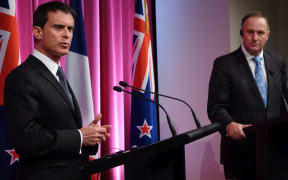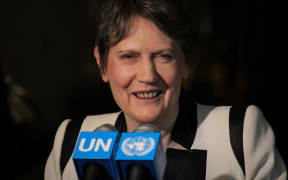UN secretary-general candidate Helen Clark says she does not want to be chosen for the job because of her gender.
If Miss Clark, who was New Zealand's prime minister from 1999 to 2008, is successful in her bid for the UN's top job, she would be be the organisation's first woman secretary-general.
Currently the administrator of the UN Development Programme, Miss Clark told CNN being a woman means she would bring new strengths to the role but she does not want to be chosen for the job because of her gender.
"For the issues of peace and war, yes, women are incredibly effective. Look at the women of Syria and the burden that they are carrying with lives, for their families, completely disrupted.
"I think bringing that very clear focus on people, their needs, how events are affecting them, is a strength I could bring."

Helen Clark is vying for the role of UN secretary-general. Photo: RNZ / Alexander Robertson
The ninth UN secretary-general will be chosen by the Security Council whose veto powers - the United States, Britain, France, Russia and China - have to agree on a candidate.
For the first, time candidates have been publicly nominated and have made campaign-style speeches before the General Assembly.
But there is no requirement for the Security Council to pay attention to the popularity of nominees with the General Assembly when it makes its decision.
During the CNN interview, Miss Clark also said the UN Security Council was behind the times.
She said things had changed since the founding of the Security Council in 1945.
"The Security Council as we see it is the post-World War Two settlement and, clearly, over seventy and a half years a lot of things have changed.
"There's new kids on the block, as it were.
She said debate about this had been going on for a long time, and options were being looked at when she was New Zealand prime minister.
"I don't expect a quick outcome to that either but I would hope that the UN member states will focus their minds on what could be done to make the Security Council look like today's reality."



